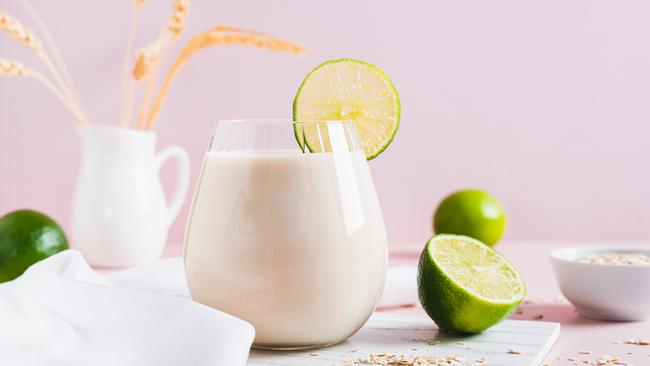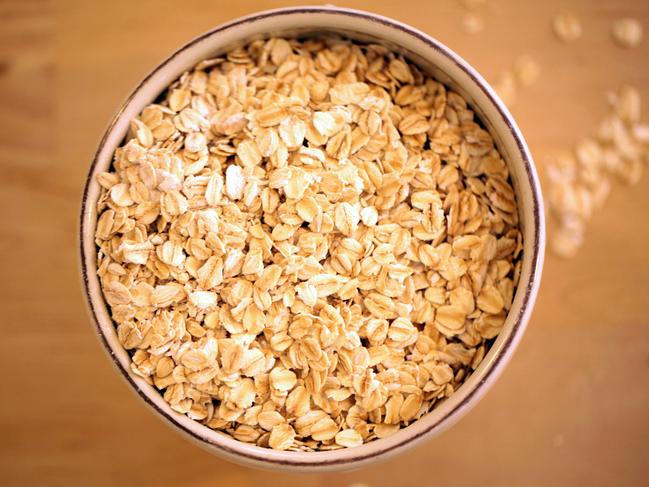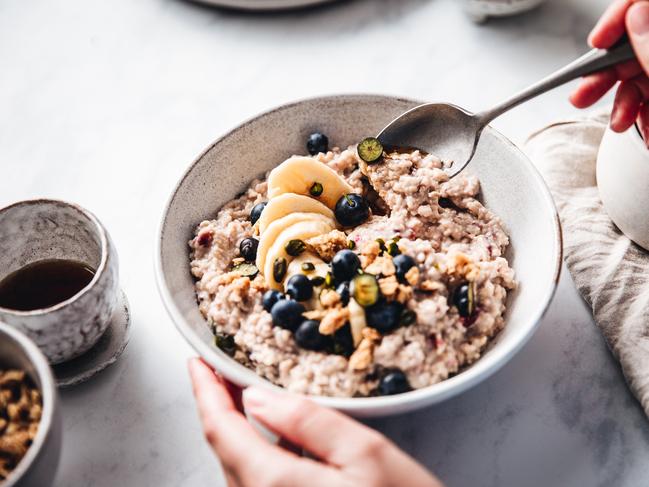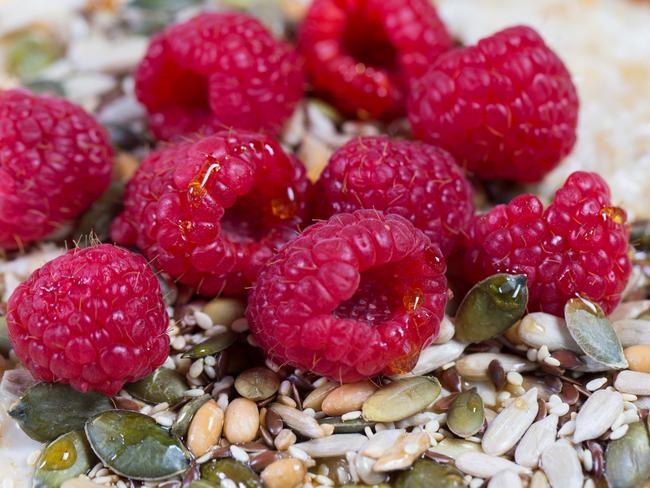Oatzempic: should you try the weight-loss ‘miracle’ drink?
The DIY beverage made from oats, water, cinnamon and lime juice has amassed over 40 million views on TikTok for its rumoured health benefits. Here’s what the experts say.

It was never going to be long before social media invented a natural alternative to the much-hyped “miracle” weight-loss injectable of the drug semaglutide, best known by the brand name Ozempic. And indeed hot on its heels comes a wellness trend in the form of an oat-based drink that will supposedly curb your appetite and lead to dramatic weight loss.
What is “Oatzempic”?
“Oatzempic”, as the DIY drink is being dubbed, is made by blending half a glass of rolled oats, a glass of water, a dash of cinnamon and a squeeze of lime juice. As rudimentary and unlikely as it sounds, it has amassed a cult following, with 40 million views on TikTok as well as before-and-after posts on Instagram.
All you need to do, Oatzempic converts claim, is to drink it a few times a day and it will fill you up, keeping hunger pangs at bay and miraculously melting away the kilos.
Is this a literal solution to the impact of obesity? Of course not.
Dr Linia Patel, a registered dietitian and spokeswoman for the British Dietetic Association, describes the craze as “madness”, and Rhiannon Lambert, a registered nutritionist and author of The Science of Plant-Based Nutrition, says, “It’s a bizarre phenomenon and there’s nothing miraculous that’s going to come from drinking a glass of blended oats and water.”

Does “Oatzempic” really work for weight loss?
However, there is a kernel of scientific truth hidden in the hype.
“Oats are rich in soluble fibre, particularly beta-glucan, which forms a gel-like substance in the digestive tract that may then help to slow down your digestion,” Patel says. “This can lead to an increased feeling of fullness and satisfaction after eating. Oats can help regulate hunger and appetite, but they are by no means a miracle weight-loss aid.”
As if a dubious viral weight-loss trend wasn’t enough to malign the reputation of the wholefood staple, there is also speculation about its heart-healthy reputation. The soluble fibre in oats has been linked to lower cholesterol and for years they have been recommended as part of a healthy diet, with the British Heart Foundation stating on its website that “porridge is our top choice for a heart-healthy breakfast”.
However, last year Dr Jack Wolfson, a certified cardiologist from Arizona who calls himself the “natural heart doctor”, questioned all this in videos he posted on social media that have attracted millions of views. In them he says that oatmeal (porridge to us) has “no nutritional value” and “contains a lot of anti-nutrients” that prevent our bodies from absorbing other vitamins and minerals. On his website he states that our hunter-gatherer ancestors “never ate oats” and that “if you want all the fibre and all the alleged benefits of oatmeal, just eat the box”.
Significant studies suggest otherwise, though. In 2016 a large review of 58 published papers in the BMJ reported that eating 3.5g a day of oat beta-glucan fibre — equivalent to the amount in a bowl of porridge and a couple of oatcakes — lowered markers of cardiovascular disease. These included a 4.2 per cent reduction in “bad” LDL cholesterol levels. And two years ago an analysis involving nearly 5000 overweight people with raised cholesterol conducted by a team of European cardiologists concluded that an oat-eating habit resulted in better blood fat profiles.
“It is well documented that the consumption of beta-glucan within oats significantly reduces LDL cholesterol profiles,” Lambert says. “And since that is a determinant of someone’s risk of developing cardiovascular disease we can conclude that, for most of us, oats are good for our hearts.”
Oats have also come under fire for causing sugar spikes in those monitoring their blood sugar levels. But Dr Duane Mellor, a registered dietician and senior teaching fellow at Aston University medical school, says that anti-oat messages have no basis in science. It’s “a normal part of digestion” for blood sugar to rise after we eat carbohydrate-rich foods including oats, Mellor says, and they are classified as a medium glycaemic index (GI) food, meaning they are absorbed more slowly than white bread and refined cereals. Any food with a medium or low GI is thought to sustain appetite and reduce hunger pangs better than ultra-processed and high GI foods.
“Most research overwhelmingly shows that oats are beneficial for our health in many ways,” Mellor says. “No food is perfect and no food is a magic bullet for health, but in general oats fit neatly into a well-balanced diet.” Here’s what they can (and can’t) do.

Will eating oats help you to lose weight?
With their medium GI and beta-glucan fibre content, “adding oats in your diet can help regulate hunger and appetite”, Patel says. Oats contain about 380 calories and about 7g of unsaturated fat per 100g, and a bowl of porridge made with 200ml of semi-skimmed milk provides about 280 calories, but the fibre means you are less likely to snack or overeat after consuming them.
One of the reasons people following the oatzempic trend may have lost weight is because they used the drink as a meal replacement and it filled them up. But you don’t need to blend oats into a drink to get the benefits — overnight oats, porridge and oatcakes will all bring benefits. A review of evidence in the journal Current Nutrition Reports last year found oat consumption to be beneficial for weight management and appetite control. That paper also highlighted oats as benefiting a healthy gut microbiome, which has been associated with weight loss and a reduced risk of obesity by other researchers.
“Beta-glucans are also a prebiotic and support the ‘good’ bugs in your gut to grow,” Patel says. “There is more and more evidence showing that a healthy, diverse community of gut bugs not only help with better digestion but are involved in appetite control as well as hormone regulation and risk of diseases.”
Do oats contain ‘anti-nutrients’?
So-called anti-nutrients are compounds naturally present in plant-based foods that reduce the body’s ability to absorb nutrients from food. Oats do contain phytic acid, found in abundance in the bran part of the oat grain, which binds to minerals including zinc, magnesium, calcium and manganese, making it difficult for your body to absorb them. However, this is not problematic if you eat an otherwise healthy diet. Lambert says the health gains from oats being a medium GI and high-fibre wholegrain outweigh any potential effects of nutrient malabsorption.
“As oats are not a natural source of these micronutrients, there is less of a reason to worry about this inhibition,” Lambert says. “A top tip is to pair your bowl of oats or granola with a fresh orange, as the vitamin C found in oranges is known to aid iron absorption and therefore cancels out the effect of the phytic acid.” You can also try soaking oats overnight, which reduces anti-nutrient levels.
Is oat milk a healthy option?
Unless you opt for oat milk because you have a cow’s milk or lactose intolerance, choosing an oat milk latte may have fewer health benefits than you think. Commercial oat milks are made from the liquid left when oats are soaked in water. They can be highly processed and some are sweetened. All are lower in protein than cow’s milk. While oat milk does contain some fibre, it is not in impressive amounts. An average serving of a commercial oat milk provides two grams of fibre, less than 10 per cent of the daily requirement for adults (30g). Lambert suggests you look for an oat milk that is fortified with iodine, calcium and, preferably, vitamin B12 and vitamin D.

Are some oats better for you than others?
Instant porridge pots and sachets are more highly processed and some contain high levels of added sugar, which cause more pronounced blood sugar spikes. Coarse, jumbo or steel-cut oats (also known as Irish oats) are minimally processed and have a slightly lower glycaemic index than rolled oats, so will have less impact on blood sugar levels. The addition of a little fat or protein will cause a less dramatic rise and fall in blood glucose levels, keeping you feeling fuller for longer.
“In my clinical practice I find that many people begin the day with a low protein intake,” Patel says. “Since protein also has a positive impact on glycaemic index, if you opt for oats in the morning make sure you take them with milk, some nuts or seeds, or stir in some Greek yoghurt or even an egg to boost the overall protein content of your breakfast.”
It is worth paying extra for organic oat products. “They typically will have much lower glyphosate contaminates from herbicides put on the crop to kill weeds,” Patel says.
Are oats gluten-free?
According to Britain’s National Health Service, oats do not contain gluten. However, they are often avoided by people with coeliac disease, a serious medical condition in which the immune system attacks the body’s own tissues when gluten is consumed. This avoidance is largely because oats are often produced in the same factories as wheat, barley and rye, which carries a risk of gluten contamination.
Oats do contain avenin, a protein similar to gluten, and according to the charity Coeliac UK this can cause sensitivities in a small percentage of people with the condition. For most people with a non-coeliac gluten sensitivity, choosing gluten-free oats is an option, although you will need to check labels carefully.
The Times




To join the conversation, please log in. Don't have an account? Register
Join the conversation, you are commenting as Logout